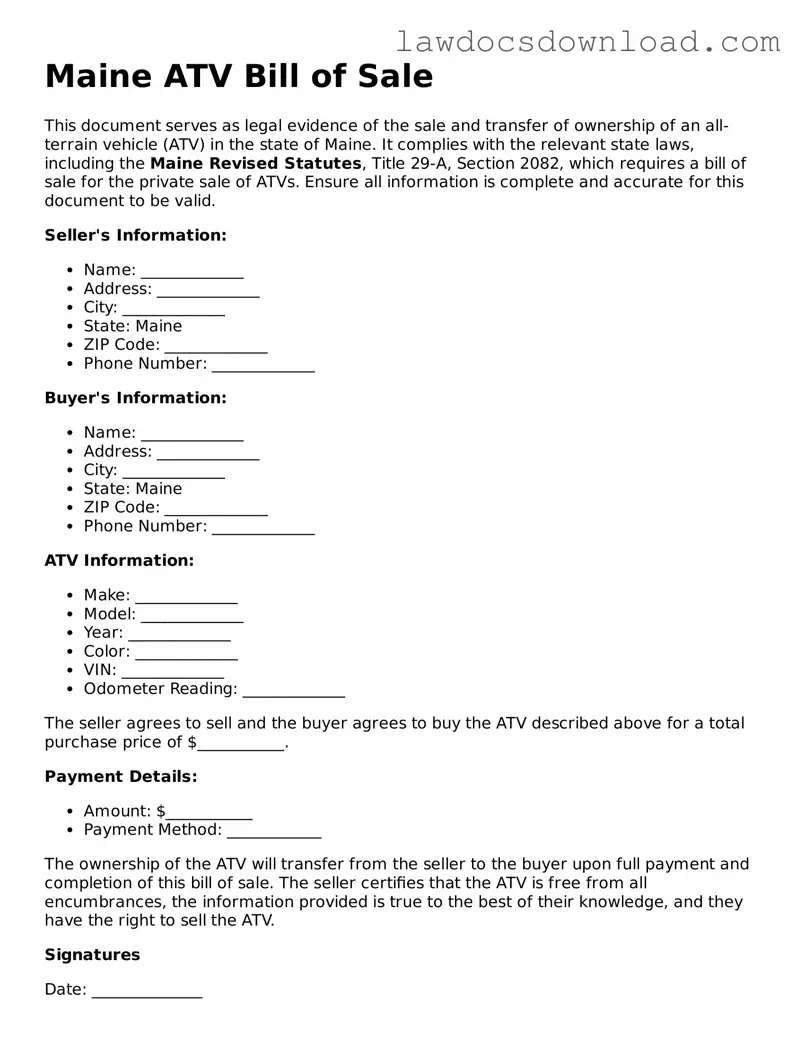The Maine ATV Bill of Sale form is similar to the Vehicle Bill of Sale document used in many states to facilitate the transfer of ownership of a vehicle from one party to another. Both forms serve as a legal record that a sale has been completed, detailing the transaction between the buyer and seller, including the sale price, date, and specifications of the vehicle or ATV in question. They often require notarization to validate the signatures of the parties involved.
This document resembles the Boat Bill of Sale, which is used specifically for the transfer of ownership of boats. Similar to the ATV Bill of Sale, the Boat Bill of Sale includes detailed information about the boat being sold, such as the make, model, year, and Hull Identification Number (HIN). It also records the agreement between the buyer and seller, capturing the transaction details to protect both parties legally.
Likewise, the Motorcycle Bill of Sale shares similarities with the ATV Bill of Sale in that it documents the sale and transfer of ownership of a motorcycle. It contains specific details about the motorcycle, like the Vehicle Identification Number (VIN), make, model, and year, alongside the sale price and the particulars of the buyer and seller. This form ensures the legality of the motorcycle sale and serves as a receipt for the transaction.
The Maine ATV Bill of Sale form is akin to the General Bill of Sale. The General Bill of Sale is used for the sale of personal property, such as electronics, furniture, or other non-titled items, and includes information regarding the item sold, the sale price, and the parties involved. Although it is more general in nature, it similarly records a transaction between a buyer and a seller to legalize the change of ownership.
Another analogous document is the Firearm Bill of Sale. This specific form is crucial for the legal sale and transfer of a firearm between private parties. It includes detailed information on the firearm, the identities of the buyer and seller, and the sale price. Similar to the ATV Bill of Sale, it may also include stipulations or warranties and typically requires notarization for added legal validity.
The Equipment Bill of Sale is also comparable, used primarily for the sale of heavy or large equipment. Like the Maine ATV Bill of Sale, this document specifies the equipment details, the transaction amount, and the identification of both the buyer and seller. Both documents serve as a proof of sale and help in the formal transfer of ownership, ensuring the transaction is legally binding.
Similar in intent and application, the Livestock Bill of Sale is used for the sale and purchase of animals, such as cattle or horses. It details the specific animal or herd being sold, including any identifying marks or tags, and records the terms of the sale. Though focused on livestock, it shares the purpose of documenting ownership transfer and transaction details with the Maine ATV Bill of Sale.
The Real Estate Bill of Sale, while used for the transfer of real property rather than personal property, parallels the ATV Bill of Sale in structure and purpose. It documents the details of the property being transferred, the buyer and seller information, and the sale price. Although it deals with a different type of asset, this form is fundamentally about formalizing the agreement between two parties and the change of asset ownership.
Last but not least, the Mobile Home Bill of Sale is akin to the Maine ATV Bill of Sale in functionality and significance. The form is used for the sale of a mobile home and includes details such as the make, model, year, and serial number of the home, alongside the transaction information. Both documents signify the completion of a sale and the transfer of ownership from one party to another, serving as legal proof of the transaction.

